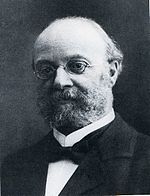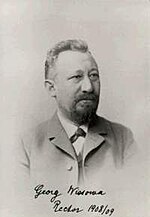List of Classical Philologists at the University of Wroclaw
The list of Classical Philologists at the University of Wroclaw includes well-known professors in this subject who worked at the Silesian Friedrich-Wilhelms-University in Wroclaw .
history
When the Friedrich-Wilhelms-Universität Breslau was founded in 1811, a seminar was founded for Classical Philology based on the model of the Berlin University , the directors of which were two full professors. The first holders of the professorships, Johann Gottlob Theaenus Schneider and Ludwig Friedrich Heindorf only worked for a short time in Breslau. Under their successors, Franz Passow and Karl Ernst Christoph Schneider , the number of philology students at the university grew considerably, so that in 1834 (after Passow's death; his successor was Friedrich Ritschl ) an additional, initially extraordinary professorship for philology and archeology was established. The first holder of this position, Julius Ambrosch , was promoted to full professorial position in 1839. In 1845 the private lecturer Friedrich Wilhelm Wagner was appointed fourth (associate) professor alongside Ritschl's successor Friedrich Haase , Schneider and Ambrosch.
When Ambrosch and Schneider died in 1856, the faculty proposed Otto Jahn and Jacob Bernays as their successors. Both were rejected by the ministry, however: Jahn because of his political activities in 1848/49, Bernays because of his Jewish denomination. Instead, August Rossbach was appointed full professor of philology and archeology. Schneider's successor was Johannes Vahlen as associate professor. In 1858 he moved to Freiburg; his position has not been filled. From 1857 Rudolf Westphal was an associate professor (successor to Wagner). When he left the university in 1862, Martin Hertz was appointed his successor and was given a full professorship.
Since 1862 there have been three full chairs for Classical Philology. The increase in students led to the fact that, in addition to these positions and the private lecturers, a further extraordinary professorship was introduced in 1873, which was also anchored in the budget in 1875. After the first owners had only taught a few semesters, Konrad Zacher taught for more than a quarter of a century from 1881 until his death in 1907. In addition, the Philological Society of Breslau was founded in 1871, a student union that existed until 1920 (see German Association of Scientists ).
In the 1880s, the number of students stagnated at first and then fell so far that by 1892 there were more lecturers than students at the seminar. The Ordinaries Hertz and Rossbach experienced this period in poor health: Hertz took leave of absence in 1891 and retired in 1893, Rossbach died in 1898 after a long illness. After his death, the two full professorships in charge of the seminar were merged into one position that Richard Foerster received. From the winter semester of 1896/1897, the number of students gradually rose again. In 1902 an assistant position was set up at the Philological Seminary.
In addition to Foerster, Friedrich Marx (1893–1896), Franz Skutsch (1896–1912), Eduard Norden (1898–1906), Paul Wendland (1906–1909) and Alfred Gercke (1909–1922) taught as ordinaries . In the 20s and early 30s, the Ordinarii Wilhelm Kroll (1913-1935), Ludolf Malten (1922-1945) and Konrat Ziegler (1920-1923) worked in Breslau. Classical archeology was assigned to his professorship for philology until Foerster retired in 1920. Since 1920 it had an independent representative with Fritz Weege (until 1945).
During the time of National Socialism , there were no dismissals among the Breslau philologists for racial reasons as at other universities. The chair representatives did not make a name for themselves as National Socialists (with the exception of Hans Drexler ), but behaved loyally or appropriately. In the spring of 1945, the University of Wroclaw was destroyed when the city was taken by Soviet troops, and most of the library and museum holdings were lost.
List of Classical Philologists
The first column shows the name of the person and their life data, the second column shows entry into the university, and the third column shows their departure. Column four names the highest position achieved at the University of Wroclaw. At other universities, the corresponding lecturer may have made an even more extensive scientific career. The next column names special features, the career path or other information relating to the university or the seminar. In the last column there are pictures of the lecturers.
|
literature
- Bernhard Kytzler : From the history of classical philology at the University of Breslau . In: Yearbook of the Schlesische Friedrich-Wilhelms-Universität zu Breslau , 31st year (1990), pp. 265–274 (brief compilation with references to further literature).
- Richard Foerster: Classical antiquity. (Philology, archeology, eloquence) . In: Georg Kaufmann: Festschrift to celebrate the centenary of the University of Breslau. Second part: History of the subjects, institutes and offices of the University of Breslau 1811–1911 , Breslau 1911. pp. 380–403 (detailed presentation based on source study and personal experience).

















